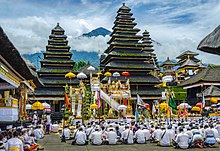
Hinduism
We found 38 free papers on Hinduism
Essay Examples
The Differentiation Of Beliefs In Hinduism And Bud
Hinduism
Nirvana
dhismThe Differentiation of Beliefs in Hinduism and BuddhismWhile Hinduism and Buddhism come from the same cultural backgrounds, they are extremely diverse in their beliefs on afterlife, deity, and rituals. Both religions believe in reincarnation, but it is where an individual goes after he or she gets off the endless cycle that differs. These religions also…
Analysis of “The Bijak” by Kabir
Hinduism
Poetry
Religion
The Bijak [Account] was the first of Kabir’s works to attract the attention of Western scholars. The members of the Kabirpanth compiled this topic after the death of Kabir, and considered it the most important and most representative of his doctrine. The Granth [Book], compiled at the beginning of the 17th century, became the sacred…
Inside a Hindu Temple
Hinduism
Prayer
Religion
Worship
The Shri Shiva Vishnu Temple, located in Lanham, Maryland, is unique in that it houses both an icon to Shiva and an icon to Vishnu. Shiva is represented with a stone lingam and Vishnu is portrayed lying upon a bed of snakes. These two icons are the center of the temple and are housed in…
Swami Vivekananda
Hinduism
Religion
Spirituality
Inspiring personality was well known both in India and in America during the last decade of the nineteenth century and the first decade of the twentieth. The unknown monk of India suddenly leapt into fame at the Parliament of Religions held in Chicago in 1893, at which he represented Hinduism. His vast knowledge of Eastern…
Modern Day Hinduism
Hinduism
Introduction In today’s world Hinduism is overpoweringly significant: peacefulness, lenience, reverence and four dignified objectives of life. Evolution of Modern day Hinduism has been from centuries of gnosis, reasoning and alteration of Vedic idea. As observed previously several dissimilar pathways to the understanding of Brahman had been engraved with the extreme and often provoking truth-seeking…
Hinduism 330 million godss
Hinduism
The film, Hinduism 330 Million Gods, provides a basic overview of Hinduism, focusing on the concept of the divine, religious practices, and the stages of life. The information is primarily derived from ordinary Hindus, with some commentary from educated Hindus. Hinduism holds a belief in multiple gods and goddesses, but also embraces a monist perspective….
Hinduism as a Major World Religion
Hinduism
Hinduism, religion that originated in India and is still practiced by most of its inhabitants, as well as by those whose families have migrated from India to other parts of the world (chiefly East Africa, South Africa, Southeast Asia, the East Indies, and England). The word Hindu is derived from the Sanskrit word sindhu (“river”-more…
Hinduism: The Third Largest Religion
Hinduism
Hinduism, unlike Christianity, Judaism or Islam, does not have a central founder, a single morality system, or a specific theology. In spite of these differences from Western religions, it is the third largest religion after Christianity and Islam. While there are many forms of Hinduism, most are considered “henotheistic”, where there is a central…
The Bizarre, Horrific Practices of the Aghori
Hinduism
Religion
In this world there are very strange, unusual, and bizarre people who commit inhuman acts. One of them is a cult known as the Aghori. This cult lives a different and far from ordinary lifestyle to say the least. Their beliefs and practices are horrendous and nauseating. They do not get recognition as some other…
Narmada: A River of Stories
Hinduism
Love
Religion
A River Sutra by Gaits Mehta is a compilation of interconnected narratives that revolve around love, the sacred Narmada River, and the narrator’s endeavor to fathom diverse tales related to the human heart. These stories are depicted through the experiences of various characters throughout the book. By the end of the novel, the narrator acquires…

